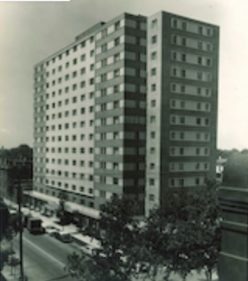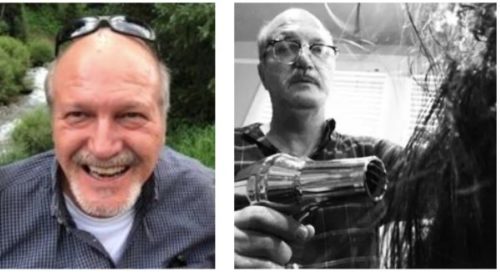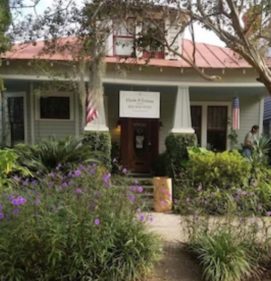Life & Island Times: Notes on Ted and His Hood
Editor’s Note: We got a great note of spleen about one of those educational comedies that masquerade as education these days. It turned into a Winds of Change story the Writer’s Section dubbed “Useful Idiots.” Winds stories are part of a blunt work intended to be a sequel to the well-received “The 70 Days,” a short tome about the period between last November 3rd and the Inauguration this year. The excitement continues, but these accounts are blunt, and not something with which we would fill your morning inbox. It is available on the website with free password access if you are extremely bored. As to “The Chatham referenced below, it is Ted’s place in the Coastal Empire, not my Big Pink in Arlington! – Vic Author’s Note:As promised earlier in mid-April, here are some initial disorganized thoughts about our late neighbor Ted Annis. Yesterday was the one-year anniversary of his passing. More will come as they are tracked down or recalled. During our time with Ted, he was a shuffling bear of a man with a warm glint in his occasionally red-rimmed eyes with a smile and a giggle that could melt your heart.
– Marlow
Notes on Ted and His Hood

Built in the early 1952 and marketed as luxury living for “dignified, gracious living,” Savannah’s Chatham Apartments – three blocks from our Park Avenue house — became blighted after only a decade as public housing by the early 1990s Savannah’s Victorian district nearly thirty years ago was one of silence and ruin. Its streets were strewn with refuse. Its buildings and homes looked vacant, worn, or dilapidated. A nearby multi-story apartment building for the elderly poor had gone to shit. Vandals, hookers, pimps, druggies, dealers, and gangbangers came and went 24/7. Little white ambulances parked in various district parking lots to speed their on-scene arrivals at shootings, ODs and muggings to up their and local hospitals save rates. Old watchmen, sitting near or in building entries or outside small business strips in straight-backed chairs read comic books while pretending to provide a thin veneer of safety for business patrons and residents.
Unlike today, with so many empty places then there was no housing shortage around here — plenty of room for everybody. Most of it was free to anyone who could easily enter by lifting a window. It was bit ironic to the few observant ones that there was little homelessness. No one had to go without a roof over one’s head. The town and its people were suffering from what I called the Methuselah Syndrome. After WW II, it degenerated by growing old and poor too fast outpacing the dwindling interest in sponsoring new growth or caring social services-oriented leadership. This once proud district’s emotional spectrum during this long period of increasing misery logically saw the normal human emotional responses of sorrow, love, fear, anger, envy, and joy disappear. The sole driving force that remained was appetite. Ravenous. Selfish. Destructive. Remorseless.
The only beings that prospered there were the cockroaches. They mated and multiplied like, well, you know. No place can be all things to all men, but Savannah had come closer than most. The Victorian district’s largest trouble was it lacked any and all businesses, especially the small ones that mattered. Convenience stores, gas stations, hair salons, drug stores, diners, groceries, branch banks and so on. Formidable would be the city’s climb out of its deep hole. Restorative things like these had been avoided as the city’s historical core residents looked after their own, relying on assets, reputations and relationships that went back to the mid-18th century. The rest of the Victorian section and many of the numbered east-west streets below it through 72nd became blighted starting near the northern boundary of Forsyth Park. The Victorian section got its start after the Civil War.
When the north of Gaston Street swells headed south through this wreckage in their locked-n-sealed, air-filtered autos, some with armed guard drivers, some with weapons at the ready on the passenger seats next to them, they looked straight ahead ignoring the area’s hazards and seeing no possible benefits in its revival.
These streets lead to the newly built shopping mall to the south of the old city’s limits were like exit tubes — just big, safe, and speedy enough that offered no room or time for emotionally cool appraising stares, cares, or thoughts. It was pioneers like our late friend, hairdresser, neighborhood association plank holder, unofficial info/power broker and old storyteller and secret sharer Ted who started thus district’s reclamation project during the early 90s that became today’s sprawling movie set redoubt for Hollywood East picture-making in town and the region.
Back then the streets were dimly lit since many streets’ lamps had burned out or had been shot out. Highlights of its underlying resilience resided in the piles of antique furnishings that lined its alley ways on trash days when collectors and newcomers would drive through to pick. They saw glimmers of gold in these darkened mineshafts. Initially it was scavenging for sure but preserving. restoring and renovating slowly over decades became predominant.
Sometimes these pickers came across the bad guys, some of whom actually flashed congenial light in their eyes that could almost pass for warmth. All knew or soon came to know that what they saw was dragon warmth. All of them failed simple empathy tests as they lacked, among many things, the capillary dilation of the so-called blush response, fluctuation of the pupils, plus the involuntary dilation of the iris. Stony stares from hard-assed, calculating people. Into this dead zone, a small-town, southeastern Georgian — skinny, not so smallish, mid 30 something, boyish hairdresser — bought a house, staked his claim, and opened his place that became Hair-a-lujah, after being on the road for 18 plus years learning his trade while proselytizing and caring for the poorest folks on earth in the most desperate places of suffering imaginable. 27 countries by his count.

Up until he moved to Savannah in the mid 1990s, Ted worked and saved his money, so he could thentravel the earth to feed, care, clothe and shelter the poor and, as his faith required, spread the Word. He would go on to help, love and redeem the district, his street, its peoples while making them and their hair look and feel fabulous. His stories were legend and the juiciest of details only came after imbibing the best red wines his listeners brought forth to him. Late nights of endless laughter and sniggering at those olden times never ceased until he did. Memory slices of him –
· Charmfully earnest as a novice Sunday School teacher
· Could sit very still — except his eyes — they’d go to his chatterers and hang on — his interest in them was total
· Three nevers — pale or expressionless in face, feet flat and still on the floor, alone
· Sort of a throwback Duesenberg with max personality whose headlights cut through the darkness, illuminating paths across barren mountains and wastelands
· Alerted customers to dangers with humorous “Caution: Curves Ahead” warnings with appropriate swayings and brayings for added effect; always good advice since some Savannah alleys (they call them lanes) experienced late night nightmarish sounds of gunfire
· Started the re-foresting of Park Avenues street lawns — all of them are now leafy and mature like those of the pre-Revolutionary War sections of town · Never took a breather, preferring to shift into ever higher gears, pop the clutch and screw on hilariously
· When we found him in bed that summer morning last year, he was cold and gray, his strong current no longer running, he had paddled off to some distant shore, the trash cans out back were full of emptied wine bottles and the fridge empty of the many others he and his laughing, card-playing friends had shared the night before
· Neither a thin or boney man, but full of promise and compassion in his dancing eyes that belied his nerves of steel . . .
· Once faced down a murderous man intent on ripping him off of his money and his life; Ted’s testimony led to his assailant’s hard time in the State Pen
· This con “forgave” Ted in a letter from the penitentiary, which led to his installing a security system just prior to the con’s parole; it would have dialed us for a response which would be, as promised and agreed to, a deadly one, no questions asked, no warnings given
· This system called us to his place the morning of his death as someone has entered his place to start that day’s hair salon business
· Dozens of us gathered out front that morning in disbelief; a year later our denial and down-in-a-hole feelings have lessened but not departed
· Like the rest of us as he aged, his mind could wander now and then, bringing him to recount long kept secrets of joys and horrors; all of these had a gentle, humorous, or poignant lesson for his listeners
· Could have left years before, sold his place and businesses (salon and vacation rental apartments); not too young to start his golden years but he always smiled and shook his head saying his job was here and so was his place in the scheme of things
· He was a collector of things, people and stories; some early warning signs of pack-ratism were present since his treasures covered most horizontal surfaces in his sprawling two plus level house, with his two main first floor living spaces — living and dining rooms — requiring not one but two levels of plate and tchotchke rail shelving — jam packed — all the way around them to display his things — in other words, Ted was fully moved in; occasionally he’d gift his visitors with something they admired; only the wiser ones would ask upon its bestowal “What are you putting up there to replace it?”; in response, he’d smirk, saying “Just you wait and see . . .”
· Ted’s life was entirely his own daily fabrication — not that of others, save for that of his Savior Our eyes squinted opened and closed that bright sunny morning but open only for moments before closing. Our hands were a bit more reliable. They searched for his presence in the house but found it bare. We edged our heads side to side, looking around for signs, but he was gone. We recovered slowly getting back up in stages, first blankly staring up at the ceilings, then sitting up, then standing. Then sitting again, resting our head in our hands. All we could see was him smiling at us like the cat who had finally eaten the canary — his smile got bigger and little spasms of laughter pumped out of his mouth as he squealed in his southeastern Georgian way “Don’t make me laugh. It makes me pee.” Slowly we pushed back our grief and came again to enjoy each new Park Avenue morning. The sun hasn’t fully risen, but the sky began to pale and then yellow. Our brooding gray stew was not very pretty, but even though we couldn’t show it, we were glad to have known him. What an effing guy!!

Ted’s place
Copyright © 2021 From My Isle Seat
www.vicsocotra.com
